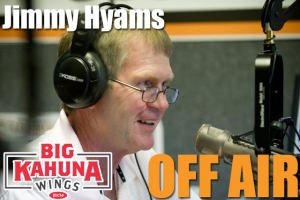
By Jimmy Hyams
In general, zone-read option teams need a mobile quarterback to have an efficient offense.
Pocket passers won’t get it done.
Tennessee’s Butch Jones has been an advocate of the spread option since he became a head coach a decade ago.
Four times, a quarterback has led his team in rushing – Josh Dobbs at Tennessee last year, Dan LeFevour for three seasons at Central Michigan (2007-09).
During most of Jones’ first two seasons at Tennessee, he had a non-running quarterback at the helm – Justin Worley. And the Vols offense struggled against Power 5 schools as UT went 2-7 against such opponents in 2013.
In 2014, the Vols started 0-5 against the Power 5 until Dobbs took over as the starter in Game 7. He led the Vols to a 4-1 finish.
The next two seasons, with Dobbs setting UT records for rushing yards and rushing touchdowns by a quarterback, Tennessee won nine games in back-to-back seasons. And last season, Tennessee led the SEC in offensive touchdowns (59) and scored more points than only one other team in school history.
Tennessee’s quarterback this season is junior Quinten Dormady, a decent athlete with a good arm. He can run, but he hasn’t. At least, not through two games. He has carried three times on zone reads thus far.
That won’t cut it against the better teams on Tennessee’s schedule. It certainly won’t cut it against Florida on Saturday.
If a quarterback isn’t a threat to run, then the offense can’t keep the defense honest. It allows a defense to stack the line and focus on the running backs. That was the case when Worley started for the Vols.
Nobody knows that better than Jones.
“To be successful, you have to be able to run the quarterback a little bit,’’ Jones said. “And he has to be able to make plays with his legs, particularly in this game (against Florida) because of their speed defensively.’’
Jones wants his quarterback to make efficient runs, that being a 4-yard gain or more.
Dormady knows he can’t be a reluctant runner for the offense to work at maximum efficiency.
“It’s just kind of taking what the defense gives you,’’ Dormady said. “I think, overall, I haven’t had to run as much this year. But if it presents itself, I’ll have to do so.’’
No one expects Dormady to run as much as Dobbs, who averaged 142 carries per year the past two seasons. Dobbs ran 104 times in 2014 in only five starts.
While some of Dobbs’ carries were sacks, more than 95 percent were off zone reads or designed runs.
Dormady doesn’t have Dobbs’ wheels. He won’t outrun defensive backs. He won’t break a slew of tackles. He’s not as slithery of a runner. Heck, Dobbs is one of the best running quarterbacks college football has seen in the past decade.
Dobbs had seven games in his career in which he rushed for 100 yards.
Dormady won’t have any.
But if Dormady – and Tennessee – wants Jones’ offense to work, the quarterback has to carry at least four to six times a game against decent competition.
And that starts with Florida.
Otherwise, you’ll get the same result as if you’re trying to put a square peg in a round hole.
It won’t fit.
Sponsored by Big Kahuna Wings: The wings that changed it all




















